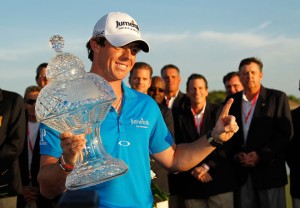by Jeff Skinner
The PGA Tour returns to Congressional Country Club this week for the AT & T National with Tiger Woods as the host. Woods will be looking to win his own tournament for the first time since 2009. But Tiger will spend plenty of time this week dealing with other issues that requires the “host’s” attention. Tiger’s foundation is the prime beneficiary of this tournament and it means so much to Woods. This week you’ll see many tributes to the armed forces as Woods has an affinity for that also.
 Say what you will about Woods but we have to recognize that he has had an immense effect on professional golf. Woods is the biggest draw in golf and has been for fifteen years. He has a winning percentage of 26 per cent (Nicklaus was around 15%) that none of his contemporaries can even come close to. He drives up attendance wherever he plays and television ratings skyrocket when he is in contention. As they say, “he doesn’t move the needle, he is the needle.”
Say what you will about Woods but we have to recognize that he has had an immense effect on professional golf. Woods is the biggest draw in golf and has been for fifteen years. He has a winning percentage of 26 per cent (Nicklaus was around 15%) that none of his contemporaries can even come close to. He drives up attendance wherever he plays and television ratings skyrocket when he is in contention. As they say, “he doesn’t move the needle, he is the needle.”
The most fortunate recipients of “The Tiger Effect” weren’t the kids that watched Tiger make golf a cool sport but the very men he was beating like a rug every week on tour.
When Tiger made his first professional start in 1996 at The Greater Milwaukee Open winner Loren Roberts took home $216,000. As Tiger’s attraction grew, so did the purses on the PGA Tour. In 2000 that same winner’s check, again paid to Roberts had more than doubled to $450,000. New money came flooding into the tour and purses exploded. In 2000 Tiger won nine official tour events and the average winner’s check was over $710,000. It was in 2001 that most of the bigger tournaments started to pay out a million dollars to the winners.
Tiger has had an amazing effect on the lives of his fellow tour players. To a man they all say he’s the best thing to happen to them as they all got richer and richer each year. In 2000 only 45 golfers earned more than a million dollars in winnings on tour. Last year there were 89 players with over a million in earnings. Certainly the Woods Effect contributed to the bulk of that.
But recently I think there has been another aspect of the Tiger Effect. With so much money coming so quickly to so many players there may be an unforeseen consequence of the Tiger  Effect. Could earning so much, so fast have a negative effect on some winners? Players are coming into the tour younger, more prepared and better than there were years ago. They earn plenty of money with endorsements and when they breakthrough for a win it is life changing. And while a win at a major championship is always a life changer it seems lately to have had a different effect on a few of the last major winners.
Effect. Could earning so much, so fast have a negative effect on some winners? Players are coming into the tour younger, more prepared and better than there were years ago. They earn plenty of money with endorsements and when they breakthrough for a win it is life changing. And while a win at a major championship is always a life changer it seems lately to have had a different effect on a few of the last major winners.
When Jack Nicklaus won his first major at the 1962 U.S. Open he left in his car with a wife and young son in tow. Some of today’s major winner’s hop on their private plane for a month of celebration sometimes forgetting what got them there in the first place.
Rory McIlroy is one of the most talented, young golfers in the world. Wins and majors look to come easy to the smiling, Northern Irishman. But his fame and fortune may have taken his golf game down bit. It has to be difficult for a young, twenty-three year old millionaire to not give in to all those distracting temptations. Rory seems to have a good head on his shoulders but he’s still only twenty-three. Heck, at twenty-three I was still wondering what I wanted to be when I grew up.
So, Rory can jet around the world to see his famous, rich tennis playing girlfriend. Or he can hop home to Ireland to play football with his mates or really do anything he wants. Like take three weeks off before a major championship, now that didn’t work too well for him. It’s funny but both Rory and his girlfriend were number one in their respective sports but since seeing each other have fallen from the top spot. Caroline Wozniacki even issued a statement saying that their relationship had no effect on their losing their number one ranking. Really?
 When Bubba Watson won The Masters this year he was declared The New American Folk Hero. Bubba is entertaining on and off the course. He appears to enjoy his time away from the game much more than when he is on the course. After The Masters Watson took some time off to celebrate becoming a father as he and his wife finalized the adoption of their new son. Certainly, Bubba deserves time with his family to deal with all that changes when you become a parent.
When Bubba Watson won The Masters this year he was declared The New American Folk Hero. Bubba is entertaining on and off the course. He appears to enjoy his time away from the game much more than when he is on the course. After The Masters Watson took some time off to celebrate becoming a father as he and his wife finalized the adoption of their new son. Certainly, Bubba deserves time with his family to deal with all that changes when you become a parent.
But remember, this is Bubba Watson who admitted that golf is boring, who doesn’t really enjoy practice and who acts like a sixth grader with A.D.D. who lost his Ritalin when he does play golf. At the U.S. Open Bubba was complaining about Olympic (before play started) and headed home early because he missed the cut. This week he returned to the Travelers for a tie for second but then announced that he won’t play again until The Open Championship and who knows when he’ll play after that.
The fact that a young golfer can earn so much so fast is a definite consequence of the Tiger Effect. The effect that all that wealth has on the golfer is another matter all together. No golfer wins on the PGA Tour without years of hard work and dedication. However, it is easy to lose sight of the thing that got that golfer there in the first place. A golfer with the talent and dedication of a Tiger Woods or a Jack Nicklaus come along once in a generation, if we are lucky. Few golfers can win like Woods and Nicklaus but they all feel the effects that the superstars had on the game.
More and more millionaires are made each year in professional golf. But that can be a double edged sword. Can these young men handle the responsibilities that come with being a super rich, superstar? It’s a difficult task and the unforeseen effect of “The Tiger Effect.”
